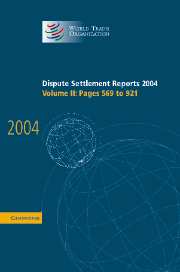Book contents
- Frontmatter
- Contents
- United States – Final Countervailing Duty Determination With Respect to Certain Softwood Lumber from Canada (WT/DS257): Report of the Appellate Body
- United States – Final Countervailing Duty Determination With Respect to Certain Softwood Lumber from Canada (WT/DS257): Report of the Panel
- Cumulative Index of Published Disputes
United States – Final Countervailing Duty Determination With Respect to Certain Softwood Lumber from Canada (WT/DS257): Report of the Appellate Body
Published online by Cambridge University Press: 13 December 2017
- Frontmatter
- Contents
- United States – Final Countervailing Duty Determination With Respect to Certain Softwood Lumber from Canada (WT/DS257): Report of the Appellate Body
- United States – Final Countervailing Duty Determination With Respect to Certain Softwood Lumber from Canada (WT/DS257): Report of the Panel
- Cumulative Index of Published Disputes
Summary
INTRODUCTION
The United States and Canada each appeals certain issues of law and legal interpretation in the Panel Report, United States – Final Countervailing Duty Determination with Respect to Certain Softwood Lumber from Canada (the “Panel Report”). The Panel was established to consider a complaint by Canada concerning countervailing duties imposed by the United States against imports of certain softwood lumber products from Canada (“softwood lumber”). Before the Panel, Canada challenged a number of aspects of the final determination by the United States Department of Commerce (“USDOC”) that led to the imposition of the duties.
On 22 May 2002, USDOC published in the United States Federal Register a countervailing duty order in respect of softwood lumber from Canada. The countervailing duty order followed a final countervailing duty determination by USDOC on 21 March 2002. In that determination, USDOC found that softwood lumber benefited from countervailable subsidies attributable to a number of Ca- nadian government programs. USDOC found that, by conferring a right to harvest timber through stumpage programs, certain provincial governments provided goods to lumber producers. According to USDOC, these goods were provided at less than adequate remuneration, thereby conferring a benefit. USDOC also found that the subsidies conferred through the stumpage programs were specific to an industry or group of industries.
Canada argued before the Panel that USDOC's final countervailing duty determination was inconsistent with the United States’ obligations under Articles 1.2, 2.1, 2.4, 10, 12, 14, 14(d), 19.1, 19.4 and 32.1 of the Agreement on Subsidies and Countervailing Measures (the “SCM Agreement”) and Article VI:3 of the General Agreement on Tariffs and Trade 1994 (the “GATT 1994”).
The Panel Report was circulated to Members of the World Trade Organization (“WTO”) on 29 August 2003. In the Panel Report, the Panel concluded, at paragraph 8.1:
(a) that the USDOC's determination that provision of stumpage constituted a financial contribution in the form of the provision of a good or service was not inconsistent with Article 1.1 (a) (1) (iii) [of the] SCM Agreement, and we therefore reject Canada's claim that the United States’ imposition of countervailing duties on the basis of that determination was inconsistent with Articles 10, 19.1, 19.4 and 32.1 [of the] SCM Agreement, and Article VI:3 of GATT 1994;
- Type
- Chapter
- Information
- Dispute Settlement Reports 2004 , pp. 571 - 640Publisher: Cambridge University PressPrint publication year: 2006
- 1
- Cited by

